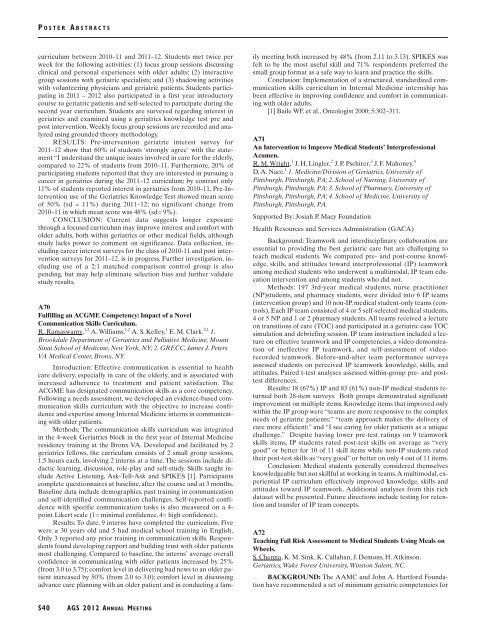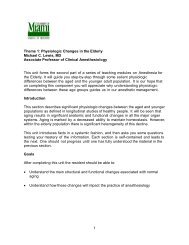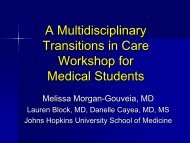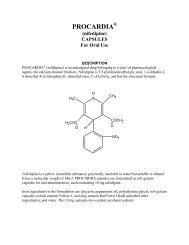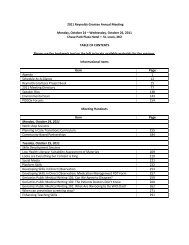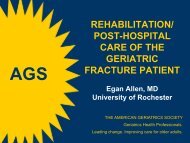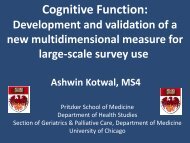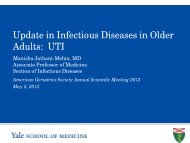Here - American Geriatrics Society
Here - American Geriatrics Society
Here - American Geriatrics Society
You also want an ePaper? Increase the reach of your titles
YUMPU automatically turns print PDFs into web optimized ePapers that Google loves.
P OSTER<br />
A BSTRACTS<br />
curriculum between 2010–11 and 2011–12. Students met twice per<br />
week for the following activities: (1) focus group sessions discussing<br />
clinical and personal experiences with older adults; (2) interactive<br />
group sessions with geriatric specialists; and (3) shadowing activities<br />
with volunteering physicians and geriatric patients. Students participating<br />
in 2011 – 2012 also participated in a first year introductory<br />
course to geriatric patients and self-selected to participate during the<br />
second year curriculum. Students are surveyed regarding interest in<br />
geriatrics and examined using a geriatrics knowledge test pre and<br />
post intervention. Weekly focus group sessions are recorded and analyzed<br />
using grounded theory methodology.<br />
RESULTS: Pre-intervention geriatric interest survey for<br />
2011–12 show that 60% of students ‘strongly agree’ with the statement<br />
“I understand the unique issues involved in care for the elderly,<br />
compared to 22% of students from 2010–11. Furthermore, 20% of<br />
participating students reported that they are interested in pursuing a<br />
career in geriatrics during the 2011–12 curriculum; by contrast only<br />
11% of students reported interest in geriatrics from 2010–11. Pre-Intervention<br />
use of the <strong>Geriatrics</strong> Knowledge Test showed mean score<br />
of 50% (sd = 11%) during 2011–12; no significant change from<br />
2010–11 in which mean score was 48% (sd= 9%).<br />
CONCLUSION: Current data suggests longer exposure<br />
through a focused curriculum may improve interest and comfort with<br />
older adults, both within geriatrics or other medical fields, although<br />
study lacks power to comment on significance. Data collection, including<br />
career interest surveys for the class of 2010-11 and post intervention<br />
surveys for 2011–12, is in progress. Further investigation, including<br />
use of a 2:1 matched comparison control group is also<br />
pending, but may help eliminate selection bias and further validate<br />
study results.<br />
A70<br />
Fulfilling an ACGME Competency: Impact of a Novel<br />
Communication Skills Curriculum.<br />
R. Ramaswamy, 1,2 A. Williams, 1,2 A. S. Kelley, 1 E. M. Clark. 2,1 1.<br />
Brookdale Department of <strong>Geriatrics</strong> and Palliative Medicine, Mount<br />
Sinai School of Medicine, New York, NY; 2. GRECC, James J. Peters<br />
VA Medical Center, Bronx, NY.<br />
Introduction: Effective communication is essential to health<br />
care delivery, especially in care of the elderly, and is associated with<br />
increased adherence to treatment and patient satisfaction. The<br />
ACGME has designated communication skills as a core competency.<br />
Following a needs assessment, we developed an evidence-based communication<br />
skills curriculum with the objective to increase confidence<br />
and expertise among Internal Medicine interns in communicating<br />
with older patients.<br />
Methods: The communication skills curriculum was integrated<br />
in the 4-week <strong>Geriatrics</strong> block in the first year of Internal Medicine<br />
residency training at the Bronx VA. Developed and facilitated by 2<br />
geriatrics fellows, the curriculum consists of 2 small group sessions,<br />
1.5 hours each, involving 2 interns at a time. The sessions include didactic<br />
learning, discussion, role-play and self-study. Skills taught include<br />
Active Listening, Ask-Tell-Ask and SPIKES [1]. Participants<br />
complete questionnaires at baseline, after the course and at 3 months.<br />
Baseline data include demographics, past training in communication<br />
and self-identified communication challenges. Self-reported confidence<br />
with specific communication tasks is also measured on a 4-<br />
point Likert scale (1= minimal confidence, 4= high confidence).<br />
Results: To date, 9 interns have completed the curriculum. Five<br />
were ≥ 30 years old and 5 had medical school training in English.<br />
Only 3 reported any prior training in communication skills. Respondents<br />
found developing rapport and building trust with older patients<br />
most challenging. Compared to baseline, the interns’ average overall<br />
confidence in communicating with older patients increased by 25%<br />
(from 3.0 to 3.75); comfort level in delivering bad news to an older patient<br />
increased by 50% (from 2.0 to 3.0); comfort level in discussing<br />
advance care planning with an older patient and in conducting a family<br />
meeting both increased by 48% (from 2.11 to 3.13). SPIKES was<br />
felt to be the most useful skill and 71% respondents preferred the<br />
small group format as a safe way to learn and practice the skills.<br />
Conclusion: Implementation of a structured, standardized communication<br />
skills curriculum in Internal Medicine internship has<br />
been effective in improving confidence and comfort in communicating<br />
with older adults.<br />
[1] Baile WF, et al., Oncologist 2000; 5:302–311.<br />
A71<br />
An Intervention to Improve Medical Students’ Interprofessional<br />
Acumen.<br />
R. M. Wright, 1 J. H. Lingler, 2 J. P. Pschirer, 3 J. F. Mahoney, 4<br />
D. A. Nace. 1 1. Medicine/Division of <strong>Geriatrics</strong>, University of<br />
Pittsburgh, Pittsburgh, PA; 2. School of Nursing, University of<br />
Pittsburgh, Pittsburgh, PA; 3. School of Pharmacy, University of<br />
Pittsburgh, Pittsburgh, PA; 4. School of Medicine, University of<br />
Pittsburgh, Pittsburgh, PA.<br />
Supported By: Josiah P. Macy Foundation<br />
Health Resources and Services Administration (GACA)<br />
Background: Teamwork and interdisciplinary collaboration are<br />
essential to providing the best geriatric care but are challenging to<br />
teach medical students. We compared pre- and post-course knowledge,<br />
skills, and attitudes toward interprofessional (IP) teamwork<br />
among medical students who underwent a multimodal, IP team education<br />
intervention and among students who did not.<br />
Methods: 197 3rd-year medical students, nurse practitioner<br />
(NP)students, and pharmacy students, were divided into 6 IP teams<br />
(intervention group) and 10 non-IP, medical student-only teams (controls).<br />
Each IP team consisted of 4 or 5 self-selected medical students,<br />
4 or 5 NP and 1 or 2 pharmacy students. All teams received a lecture<br />
on transitions of care (TOC) and participated in a geriatric case TOC<br />
simulation and debriefing session. IP team instruction included a lecture<br />
on effective teamwork and IP competencies, a video demonstration<br />
of ineffective IP teamwork, and self-assessment of videorecorded<br />
teamwork. Before-and-after team performance surveys<br />
assessed students on perceived IP teamwork knowledge, skills, and<br />
attitudes. Paired t-test analyses assessed within-group pre- and posttest<br />
differences.<br />
Results: 18 (67%) IP and 83 (61%) non-IP medical students returned<br />
both 28-item surveys. Both groups demonstrated significant<br />
improvement on multiple items. Knowledge items that improved only<br />
within the IP group were “teams are more responsive to the complex<br />
needs of geriatric patients;” “team approach makes the delivery of<br />
care more efficient;” and “I see caring for older patients as a unique<br />
challenge.” Despite having lower pre-test ratings on 9 teamwork<br />
skills items, IP students rated post-test skills on average as “very<br />
good” or better for 10 of 11 skill items while non-IP students rated<br />
their post-test skills as “very good” or better on only 4 out of 11 items.<br />
Conclusion: Medical students generally considered themselves<br />
knowledgeable but not skillful at working in teams. A multimodal, experiential<br />
IP curriculum effectively improved knowledge, skills and<br />
attitudes toward IP teamwork. Additional analyses from this rich<br />
dataset will be presented. Future directions include testing for retention<br />
and transfer of IP team concepts.<br />
A72<br />
Teaching Fall Risk Assessment to Medical Students Using Meals on<br />
Wheels.<br />
S. Chenna, K. M. Sink, K. Callahan, J. Demons, H. Atkinson.<br />
<strong>Geriatrics</strong>, Wake Forest University, Winston Salem, NC.<br />
BACKGROUND: The AAMC and John A. Hartford Foundation<br />
have recommended a set of minimum geriatric competencies for<br />
S40<br />
AGS 2012 ANNUAL MEETING


